Unit 2 How often do you do exercise.教案(5课时)
文档属性
| 名称 | Unit 2 How often do you do exercise.教案(5课时) | 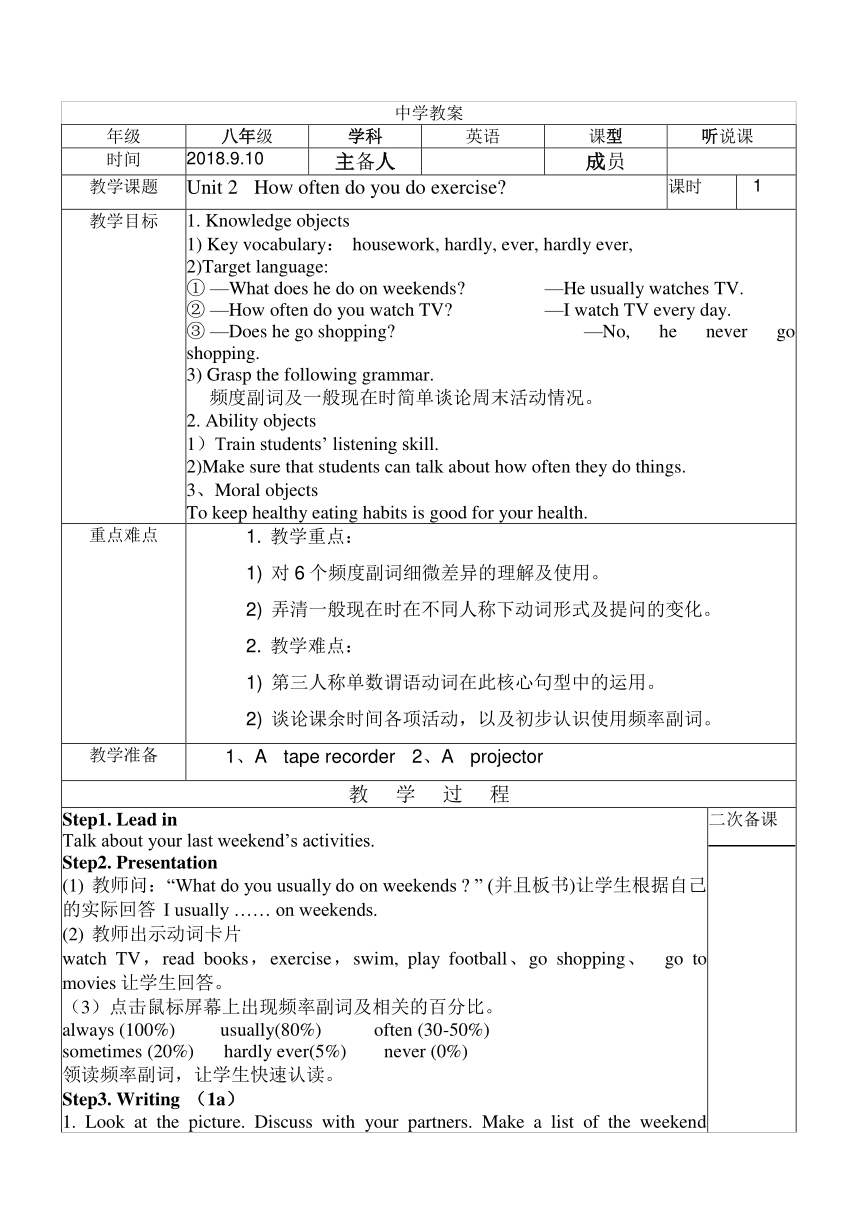 | |
| 格式 | zip | ||
| 文件大小 | 35.3KB | ||
| 资源类型 | 教案 | ||
| 版本资源 | 人教新目标(Go for it)版 | ||
| 科目 | 英语 | ||
| 更新时间 | 2018-10-26 19:44:56 | ||
图片预览

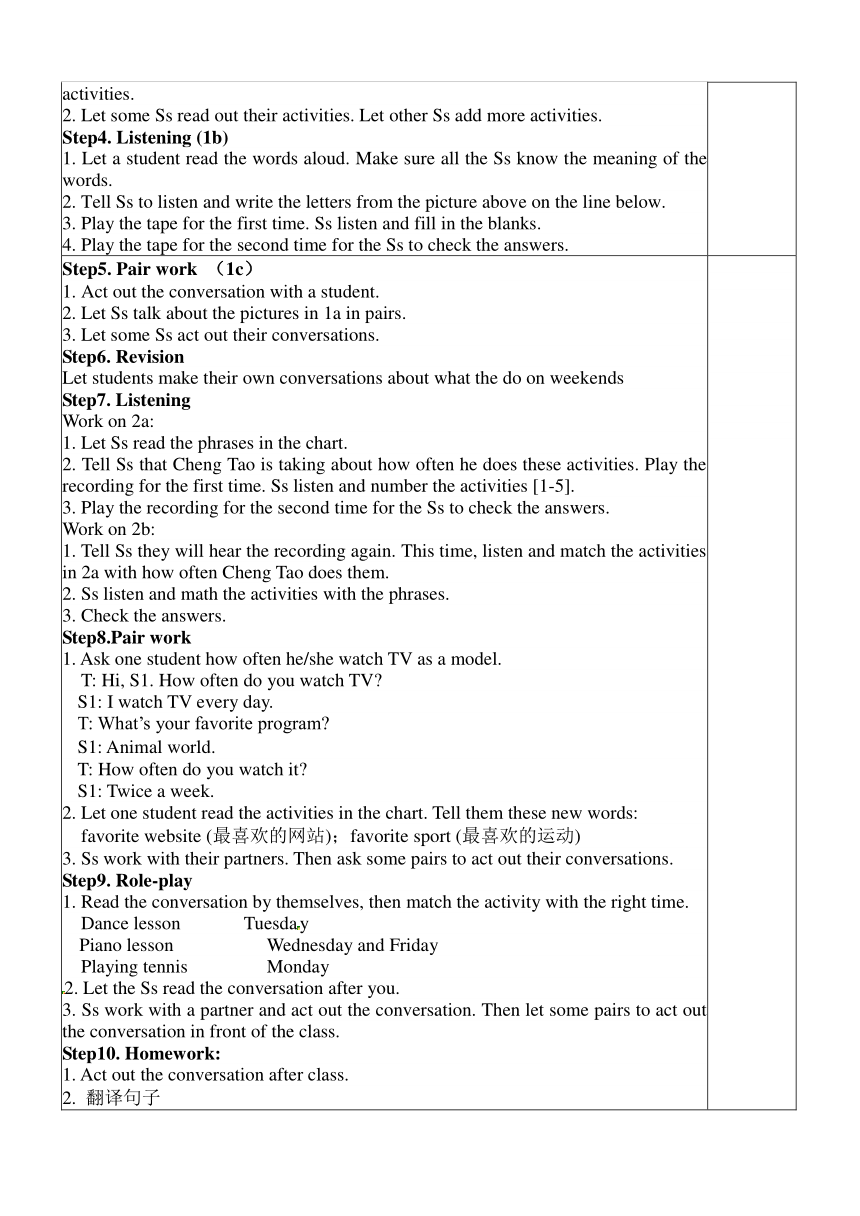
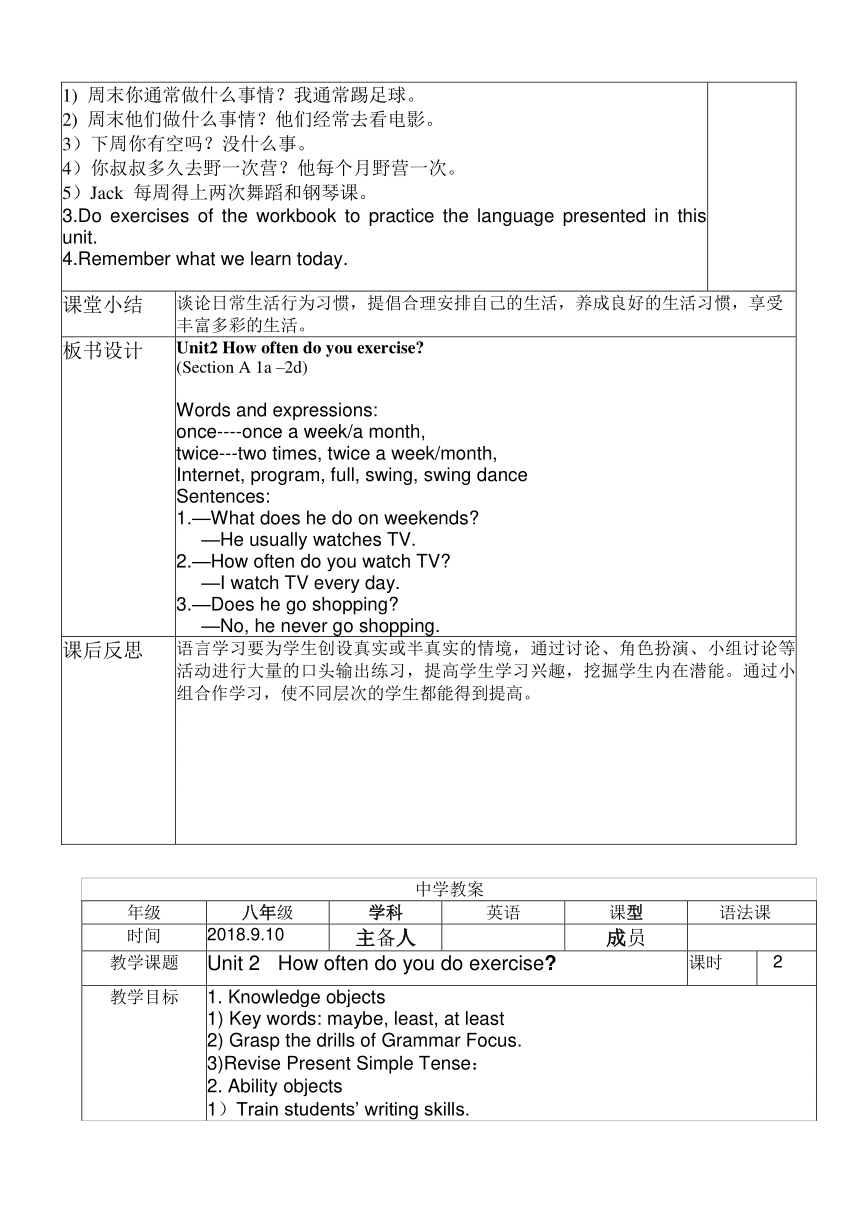
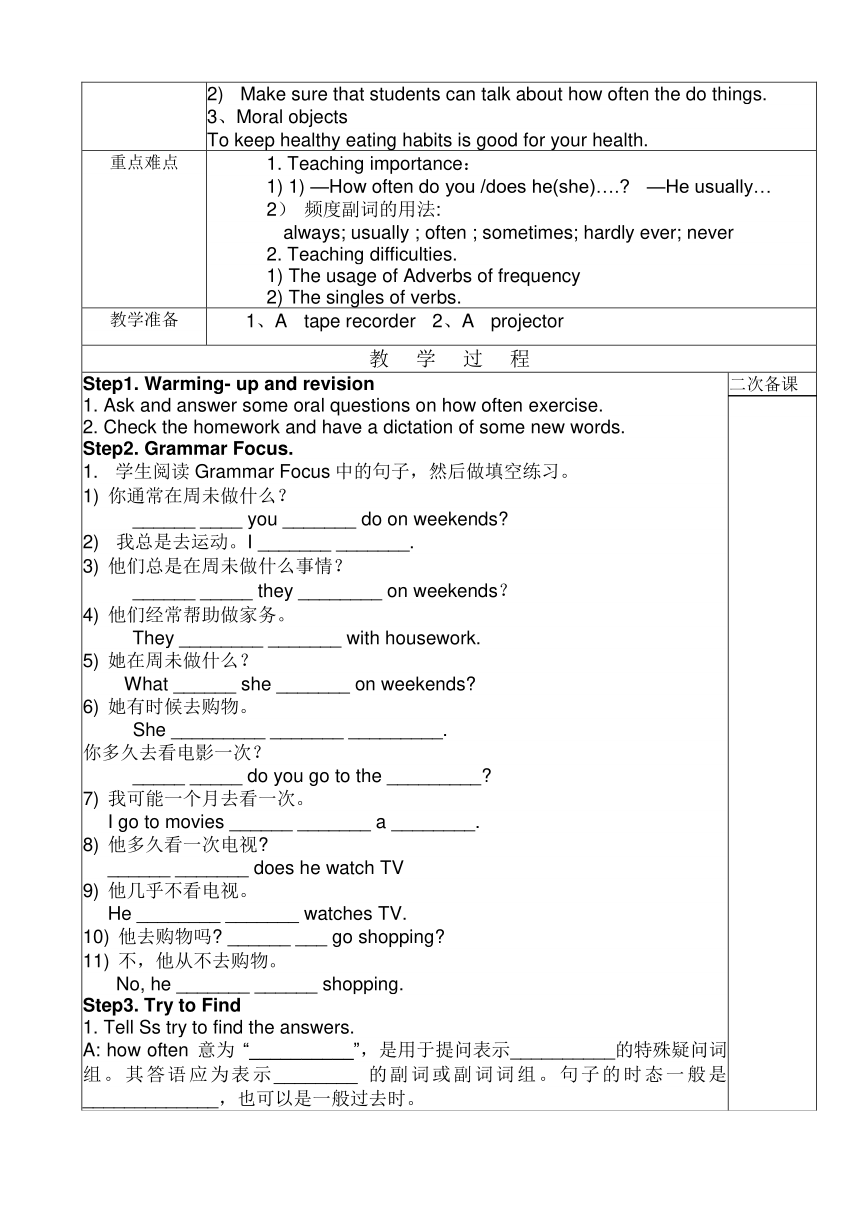
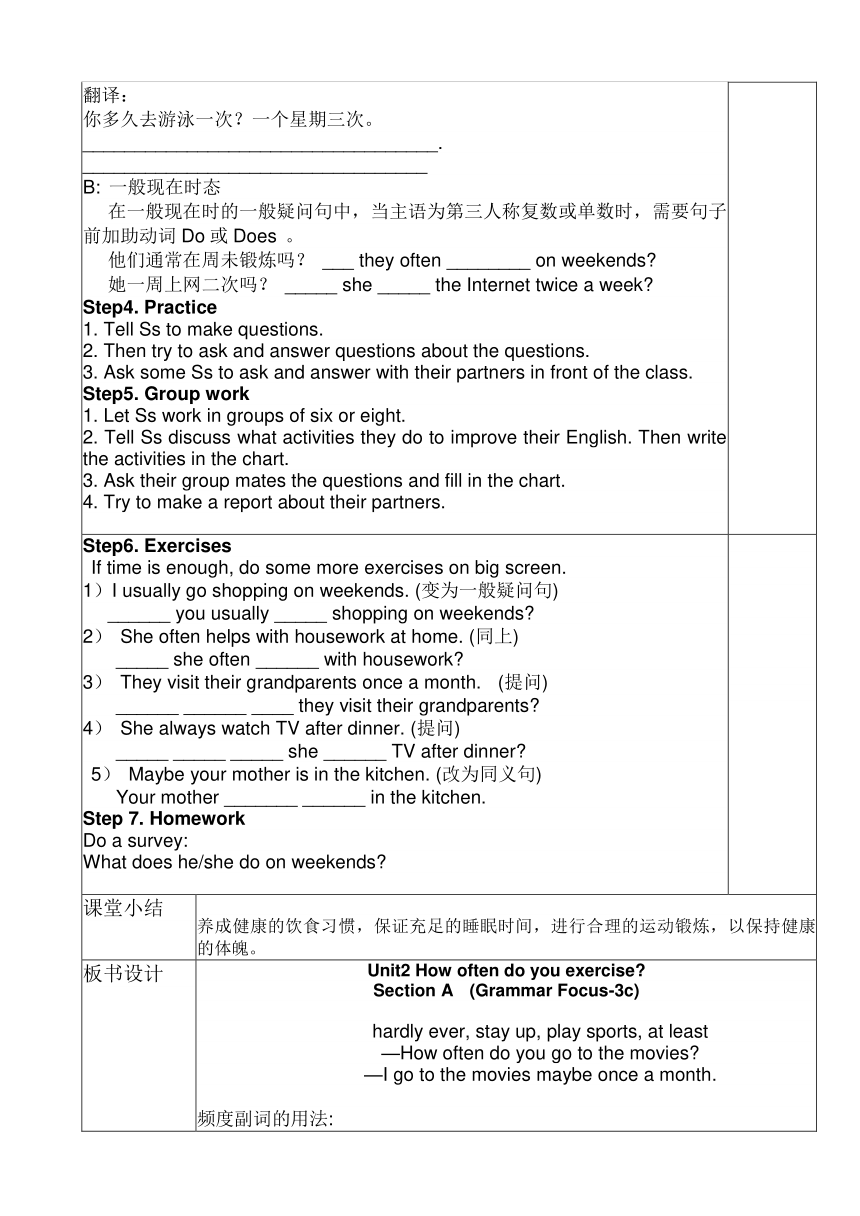
文档简介
中学教案
年级
八年级
学科
英语
课型
听说课
时间
2018.9.10
主备人
成员
教学课题
Unit 2 How often do you do exercise?
课时
1
教学目标
1. Knowledge objects
1) Key vocabulary: housework, hardly, ever, hardly ever,
2)Target language:
① —What does he do on weekends? —He usually watches TV.
② —How often do you watch TV? —I watch TV every day.
③ —Does he go shopping? —No, he never go shopping.
3) Grasp the following grammar.
频度副词及一般现在时简单谈论周末活动情况。
2. Ability objects
1)Train students’ listening skill.
2)Make sure that students can talk about how often they do things.
3、Moral objects
To keep healthy eating habits is good for your health.
重点难点
1. 教学重点:
1) 对6个频度副词细微差异的理解及使用。
2) 弄清一般现在时在不同人称下动词形式及提问的变化。
2. 教学难点:
1) 第三人称单数谓语动词在此核心句型中的运用。
2) 谈论课余时间各项活动,以及初步认识使用频率副词。
教学准备
1、A tape recorder 2、A projector
教 学 过 程
Step1. Lead in
Talk about your last weekend’s activities.
Step2. Presentation
(1) 教师问:“What do you usually do on weekends ? ” (并且板书)让学生根据自己的实际回答 I usually …… on weekends.
(2) 教师出示动词卡片
watch TV,read books,exercise,swim, play football、go shopping、 go to movies让学生回答。
(3)点击鼠标屏幕上出现频率副词及相关的百分比。
always (100%) usually(80%) often (30-50%)
sometimes (20%) hardly ever(5%) never (0%)
领读频率副词,让学生快速认读。
Step3. Writing (1a)
1. Look at the picture. Discuss with your partners. Make a list of the weekend activities.
2. Let some Ss read out their activities. Let other Ss add more activities.
Step4. Listening (1b)
1. Let a student read the words aloud. Make sure all the Ss know the meaning of the words.
2. Tell Ss to listen and write the letters from the picture above on the line below.
3. Play the tape for the first time. Ss listen and fill in the blanks.
4. Play the tape for the second time for the Ss to check the answers.
二次备课
Step5. Pair work (1c)
1. Act out the conversation with a student.
2. Let Ss talk about the pictures in 1a in pairs.
3. Let some Ss act out their conversations.
Step6. Revision
Let students make their own conversations about what the do on weekends
Step7. Listening
Work on 2a:
1. Let Ss read the phrases in the chart.
2. Tell Ss that Cheng Tao is taking about how often he does these activities. Play the recording for the first time. Ss listen and number the activities [1-5].
3. Play the recording for the second time for the Ss to check the answers.
Work on 2b:
1. Tell Ss they will hear the recording again. This time, listen and match the activities in 2a with how often Cheng Tao does them.
2. Ss listen and math the activities with the phrases.
3. Check the answers.
Step8.Pair work
1. Ask one student how often he/she watch TV as a model.
T: Hi, S1. How often do you watch TV?
S1: I watch TV every day.
T: What’s your favorite program?
S1: Animal world. [来源:学科网]
T: How often do you watch it?
S1: Twice a week.
2. Let one student read the activities in the chart. Tell them these new words:
favorite website (最喜欢的网站);favorite sport (最喜欢的运动)
3. Ss work with their partners. Then ask some pairs to act out their conversations.
Step9. Role-play
1. Read the conversation by themselves, then match the activity with the right time.
Dance lesson Tuesday
Piano lesson Wednesday and Friday
Playing tennis Monday
2. Let the Ss read the conversation after you.
3. Ss work with a partner and act out the conversation. Then let some pairs to act out the conversation in front of the class.
Step10. Homework:
1. Act out the conversation after class.
2. 翻译句子
1) 周末你通常做什么事情?我通常踢足球。
2) 周末他们做什么事情?他们经常去看电影。
3)下周你有空吗?没什么事。
4)你叔叔多久去野一次营?他每个月野营一次。
5)Jack 每周得上两次舞蹈和钢琴课。
3.Do exercises of the workbook to practice the language presented in this unit.
4.Remember what we learn today.
课堂小结
谈论日常生活行为习惯,提倡合理安排自己的生活,养成良好的生活习惯,享受丰富多彩的生活。
板书设计
Unit2 How often do you exercise?
(Section A 1a –2d)
Words and expressions:
once----once a week/a month,
twice---two times, twice a week/month,
Internet, program, full, swing, swing dance
Sentences:
1.—What does he do on weekends?
—He usually watches TV.
2.—How often do you watch TV?
—I watch TV every day.
3.—Does he go shopping?
—No, he never go shopping.
课后反思
语言学习要为学生创设真实或半真实的情境,通过讨论、角色扮演、小组讨论等活动进行大量的口头输出练习,提高学生学习兴趣,挖掘学生内在潜能。通过小组合作学习,使不同层次的学生都能得到提高。
中学教案
年级
八年级
学科
英语
课型
语法课
时间
2018.9.10
主备人
成员
教学课题
Unit 2 How often do you do exercise?
课时
2
教学目标
1. Knowledge objects
1) Key words: maybe, least, at least
2) Grasp the drills of Grammar Focus.
3)Revise Present Simple Tense:
2. Ability objects
1)Train students’ writing skills.
2) Make sure that students can talk about how often the do things.
3、Moral objects
To keep healthy eating habits is good for your health.
重点难点
1. Teaching importance:
1) 1) —How often do you /does he(she)….? —He usually…
2) 频度副词的用法:
always; usually ; often ; sometimes; hardly ever; never
2. Teaching difficulties.
1) The usage of Adverbs of frequency
2) The singles of verbs.
教学准备
1、A tape recorder 2、A projector
教 学 过 程
Step1. Warming- up and revision
1. Ask and answer some oral questions on how often exercise.
2. Check the homework and have a dictation of some new words.
Step2. Grammar Focus.
1. 学生阅读Grammar Focus中的句子,然后做填空练习。
1) 你通常在周未做什么?
______ ____ you _______ do on weekends?
2) 我总是去运动。I _______ _______.
3) 他们总是在周未做什么事情?
______ _____ they ________ on weekends?
4) 他们经常帮助做家务。
They ________ _______ with housework.
5) 她在周未做什么?
What ______ she _______ on weekends?
6) 她有时候去购物。
She _________ _______ _________.
你多久去看电影一次?
_____ _____ do you go to the _________?
7) 我可能一个月去看一次。
I go to movies ______ _______ a ________.
8) 他多久看一次电视?
______ _______ does he watch TV
9) 他几乎不看电视。
He ________ _______ watches TV.
10) 他去购物吗? ______ ___ go shopping?
11) 不,他从不去购物。
No, he _______ ______ shopping.
Step3. Try to Find
1. Tell Ss try to find the answers.
A: how often 意为 “__________”,是用于提问表示__________的特殊疑问词组。其答语应为表示________ 的副词或副词词组。句子的时态一般是_____________,也可以是一般过去时。
翻译:
你多久去游泳一次?一个星期三次。
__________________________________.
_________________________________
B: 一般现在时态
在一般现在时的一般疑问句中,当主语为第三人称复数或单数时,需要句子前加助动词Do或Does 。
他们通常在周未锻炼吗? ___ they often ________ on weekends?
她一周上网二次吗? _____ she _____ the Internet twice a week?
Step4. Practice
1. Tell Ss to make questions.
2. Then try to ask and answer questions about the questions.
3. Ask some Ss to ask and answer with their partners in front of the class.
Step5. Group work
1. Let Ss work in groups of six or eight.
2. Tell Ss discuss what activities they do to improve their English. Then write the activities in the chart.
3. Ask their group mates the questions and fill in the chart.
4. Try to make a report about their partners.
二次备课
Step6. Exercises
If time is enough, do some more exercises on big screen.
1)I usually go shopping on weekends. (变为一般疑问句)
______ you usually _____ shopping on weekends?
2) She often helps with housework at home. (同上)
_____ she often ______ with housework?
3) They visit their grandparents once a month. (提问)
______ ______ ____ they visit their grandparents?
4) She always watch TV after dinner. (提问)
_____ _____ _____ she ______ TV after dinner?
5) Maybe your mother is in the kitchen. (改为同义句)
Your mother _______ ______ in the kitchen.
Step 7. Homework
Do a survey:
What does he/she do on weekends?
课堂小结
养成健康的饮食习惯,保证充足的睡眠时间,进行合理的运动锻炼,以保持健康的体魄。
板书设计
Unit2 How often do you exercise?
Section A (Grammar Focus-3c)
hardly ever, stay up, play sports, at least
—How often do you go to the movies?
—I go to the movies maybe once a month.
频度副词的用法:
always; usually ; often ; sometimes; hardly ever; never
how often 意为 “__________”,是用于提问表示__________的特殊疑问词组。其答语应为表示________的副词或副词词组。句子的时态一般是_____________,也可以是一般过去时。
翻译:
你多久去游泳一次?一个星期三次。
课后反思
评价可以使学生认识自我,树立自信,有助于反思及调整自己的学习过程,我用大量不同词汇的口语表扬,对学生学习过程中的表现及反映的情感、态度、策略等方面进行及时的评价,发现学生的进步,鼓励学生自我反思,自我提高。
中学教案
年级
八年级
学科
英语
课型
听说课
时间
2018.9.10
主备人
成员
教学课题
Unit 2 How often do you do exercise?
课时
3
教学目标
Knowledge objects
1) Key vocabulary: junk, junk food, coffee, health.
2) Target language: Grasp the following structures:
① —How often do you drink milk? —I drink m every day.
② —How often do you exercise? —Twice a week.
③ —Does Tina have good habits?
4) – She says it’s good for my health.
5)---How many hours do you sleep every night?
2. Ability objects
1)Train students’ listening skill.
2) Grasp the Target language.
3、Moral objects
Good habits are good for your health. Keep good habits.
重点难点
1. Teaching importance:
Grasp the Target language.
2. Teaching difficulties.
1) Improve students’ listening skills.
2) Students can talk their activities using the Target language
教学准备
1、a tape recorder 2、a projector
教学过程
Step1. Warming- up and revision
1. Daily greeting.
2. Check the homework. Let some Ss report what he/she does on weekends.
Step2. Presentation
1. T: Show some pictures of food or drink on the big screen.
Ss read the words then discuss they are healthy or unhealthy.
2. Work on 1a.
Read the words with the pictures then match the words with the pictures.
Step3. Find
1. Show a list of words of food and drinks on the big screen. Then list them into “healthy” or “unhealthy”
2. Check the answer with the Ss.
3. Ask and answer questions about the pictures on 1a.
Make a model to the Ss:
T: How often do you drink milk, S1?
S1: I drink milk every day.
T: Do you like it?
S1: No, but my mother wants me to drink it. She says it’s good for my health.
二次备课
Step4. Listening
Work on 1c:
1. Tell Ss that a reporter is interviewing Bill and Tina what their eating habits are. Listen to the recording and find the answer to these two questions: Is Bill healthy? Is Tina healthy? Listen and find the answers to the questions.
3. T: Now let's work on 1d. First, let one student read the sentences and try to know the meaning of the sentences.
4. Play the first time, Ss just listen. Play the tape for the second time for the Ss to listen and find the answers.
5. Check the answers:
Step5. Pair work
1. Work in pairs. Ask and answer questions.
SA is the reporter. SB is Tina or Bill. Ask and answer questions. Then change roles.
e.g. ─How often do you exercise?
─I exercise every day?
─And how often do you …?
─I exercise …
2. Teacher can walk around the classroom, and give some help to the Ss.
Step6 Homework
Finish the exercise in this period.
课堂小结
谈论日常生活行为习惯,提倡合理安排自己的生活,养成良好的生活习惯,享受丰富多彩的生活。
板书设计
Unit2 How often do you exercise?
(SectionB 1a –1e)
1.New words and phrase: junk, junk food, coffee, health.
want sb to do sth, be good for, how many books
good habits
2. Structures:
① —How often do you drink milk? —I drink m every day.
② —How often do you exercise? —Twice a week.
③ —Does Tina have good habits?
4) – She says it’s good for my health.
5)---How many hours do you sleep every night?
课后反思
在最后的速度短文后,只让学生自己起来读,没有跟读,缺乏对语音语调的模仿。
教师的课堂用语还需进一步完善,教师应该进一步提高自身素质,灵活处理课堂变化。
总之,一节课结束后总结成功之处,积极整改不足之处,不断完善教师自我的知识能力和水平,也不断完善高效的英语课堂。
中学教案
年级
八年级
学科
英语
课型
阅读课
时间
2018.9.10
主备人
成员
教学课题
Unit 2 How often do you do exercise?
课时
4
教学目标
Knowledge objects
1) Key vocabulary: result, percent, online, television, although, through, mind, body, such, such as, together, die, writer.
2) Target language: Grasp the following structures:
① not …at all
② The best way to … is ….
③ such as…
2. Ability objects
1)Train students’ reading skills.
2) Grasp the Target language.
3、Moral objects
Keep good habits and learn from the people who have good habits.
重点难点
1. Teaching importance:
1) Grasp the new words and expressions.
2) Reading practice, Improve students’ reading comprehension skills.
2. Teaching difficulties.
1) Grasp so many new words in one class.
2) Improve students’ reading skills.
3) Students can finish the exercise of “2c, 2d”using the Target language.
教学准备
1、a tape recorder 2、 a projector
教学过程
Step 1 :Greeting.
Step2 : Presentation
The teacher asks Ss other questions:
How often do you exercise/watch TV/read English/play computer games?
How many hours do you exercise/watch TV/read English/sleep/play computer games?
Step 3. Finish2a:
1. Let Ss discuss the activities with their classmates and rank these activities according to how often you think your classmates do them.
2. Let some Ss tell their answers.
Step4. Reading 2b
1. T: Here are the results of what the students in No. 5 High School do in their free time. Read the passage quickly and find the answers to the two questions:
1) How many kinds of free time activities are mentioned in the passage?
_______________________________
2)What is the best way to relax? _________________________________
2. Read the passage carefully and complete the pie chart below.
Ss read the passage and try to fill in the pie chart. Then check the answers together.
Step5. Reading ,2c
1. T: Now let’s read through the five questions. Make sure the Ss know the meaning of the questions. Then let Ss read the passage again and try to find the answers to the questions.
3. Ss read carefully and try to find the answers to the questions.
二次备课
4. Check the answers with the class.
Step6.Work on 2d:
1. T: Now let’s make some sentences with the percentages using always, usually or sometimes.
3. Ss read the passage again and try to make some new sentences. Check the answers with each others.
Step7.Work on 2e:
1. Let Ss read through the activities in the chart first. Select one activity from them. Then ask their classmates how often they do this activity and make a pie chart.
2. Ss work in groups. Ask and answer questions then fill in the chart.
3. Make a pie chart like those in 2b.
4. Then try to make a short report like the report in 2b.
Step8.Presentation and Practice
Free talk. “What is a healthy lifestyle”.
After that, T can show a picture with healthy lifestyle and unhealthy one:
eat fruit never eat vegetables/fruit
vegetables drink coffee/wine too much
drink milk never drink milk
sleep 9 hours sleep 5 hours
do exercise never do exercise
healthy lifestyle unhealthy lifestyle
T: And you know: Healthy lifestyle can help us get good grades. Good food and exercise help us to study better. My student Katrina has a good lifestyle. Let’s see it.
Step9. Read 3a.
Compare the passage with yourselves.
Explain:
of course , pretty healthy/good ,unhealthy ,a healthy lifestyle, try to do sth..,
look after, help sb. to do sth., study better, the same as, be different from
Give more examples.
Step5 Homework
1.Revise the new words .
2. Preview the next section
3. Finish the exercise in this period.
4. Write the report in the exercise book.
课堂小结
合理安排自己的生活,养成良好的生活习惯,享受丰富多彩的生活。
Old habits die hard. 旧习难改
板书设计
Unit2 How often do you exercise?
(Section B2a-3a)
in the free time 在空闲时间 ask sb. about sth. 询问某人关于某事
at least 至少;不少于;起码 be good for health 对健康有好处
draw pictures 画画 go online 上网
go camping 去野营 less than 少于
课后反思
在最后的速度短文后,只让学生自己起来读,没有跟读,缺乏对语音语调的模仿。
中学教案
年级
八年级
学科
英语
课型
写作课
时间
2018.9.10
主备人
成员
教学课题
Unit 2 How often do you do exercise?
课时
5
教学目标
Knowledge objects
1) Key vocabulary: dentist, magazine, however, than, more than, almost, none, less, less than, point
2) Revise asking and talking about eating habits and exercising habits.
3) Sum up and revise the Adverbs of Frequency
2. Ability objects
1)Train students’ writing skills.
2) Grasp the Target language.
3、Moral objects
Keep good habits and learn from the people who have good habits.
重点难点
1. Teaching importance:
1) Grasp the new words and expressions.
2) Writing practice, Improve students’ writing skills.
2. Teaching difficulties.
1) Grasp Knowledge objects.
2) Improve students’ writing skills.
3) Write a report about their good and bad habits using the Target language.
教学准备
1、a tape recorder 2、a projector
教学过程
Step1. Warming- up and revision
1. Have a dictation of the new words and expressions.
2. Let some Ss read the passage in 2b.
3. Check the homework.
Step2. Presentation
1. Show some pictures of your daily activities. Tell Ss your good activities and bad activities.
2. Let some Ss tell about how often they do some activities and judge they are good habits and bad habits.
Step3. Practice
1. Look at the information in the chart and complete the report.
2. 阅读指导:
首先,通读短文,了解短文的大体意思。读表格中活动及后面的做此活动所用的时间,并确定做此事的频率,可以在每个活动后面写出相应的频率词。如:Exercise应用always/every day;read books 也是always/every day;drink juice应为usually; …
3. Ss read the passage then fill in the blanks with the words in the box.
4. Check the answers.
Step4. Writing
Work on 3b:
1. Complete the chart with your own information. Then in the last column, use expressions like always, every day, twice a week and never.
2. Then let some Ss show their chart to the class.
Work on 3c:
二次备课
1. Let Ss write a report about their good habits and bad habits. Say how often they do things using the report in 3a as an example.
2. 写作指导:
首先,根据自己所填写的表格,写出相关的自己的好习惯及坏习惯的句子。然后,按先叙述好习惯,再叙述坏习惯。将这些句子排列在一起。注意,连接词的运用,如:however, also等。让句子更加简洁和流畅。
Check the compositions and let some Ss read their compositions.
Step5. Work on 4 A quiz
1. Tell Ss to take the health quiz. Compare your results with your partner’s. Who’s healthier?
2. Read the quiz and the chart first and make sure all the students know how to take the health quiz.
3. Work in groups and take the quiz in your group. See who is healthier?
Step6. Practice
Self Check 1 and 2
1. 让学生相互讨论并在表格中填写出自己及自己的父母亲所做的活动。
2. Let some Ss read aloud their chart. Then try to write five sentences using the information above.
3. Make sure they use the correct forms of the verbs.
Self check 3
1. Tell Ss that they should read the conversation and then fill in the blanks with the right forms.
2. Ss read the conversations and try to fill in the blanks.
3. Check the answers:
usually, How often, Hardly, How often, once a; never
4. Let Ss practice the conversation with their partner.
Step 7. Homework
1. Review Section B.
2. Write a short passage your father or mother’s good habits or bad habits.
课堂小结
谈论日常生活行为习惯,提倡合理安排自己的生活,养成良好的生活习惯,享受丰富多彩的生活。
板书设计
Unit2 How often do you exercise?
(Section B 3a- Self check)
3b: exercise often, read books every day, drink juice usually, never stay up late
eat hamburgers sometimes, always watch TV for two hours, hardly ever help with housework
3c: One possible version:
I have lots of good habits. I exercise every day. I always read books. I eat fruit every day. I drink milk twice a week. I never stay up late. But I have some bad habits, too. I always watch TV for two hours a day. I use the Internet twice a week. I hardly ever help with housework. I never go to the dentist.
Self check 3:
usually, how often, hardly, how often, twice a,never
课后反思
大部分学生都能积极投入到课堂教学中来,并积极举手发言。课堂气氛比较活跃,调动了学生听课的积极性,提高学生实际的语言交流能力
同课章节目录
- Unit 1 Where did you go on vacation?
- Section A
- Section B
- Unit 2 How often do you exercise?
- Section A
- Section B
- Unit 3 I'm more outgoing than my sister.
- Section A
- Section B
- Unit 4 What's the best movie theater?
- Section A
- Section B
- Unit 5 Do you want to watch a game show?
- Section A
- Section B
- Unit 6 I'm going to study computer science.
- Section A
- Section B
- Unit 7 Will people have robots?
- Section A
- Section B
- Unit 8 How do you make a banana milk shake?
- Section A
- Section B
- Unit 9 Can you come to my party?
- Section A
- Section B
- Unit 10 If you go to the party, you'll have a grea
- Section A
- Section B
